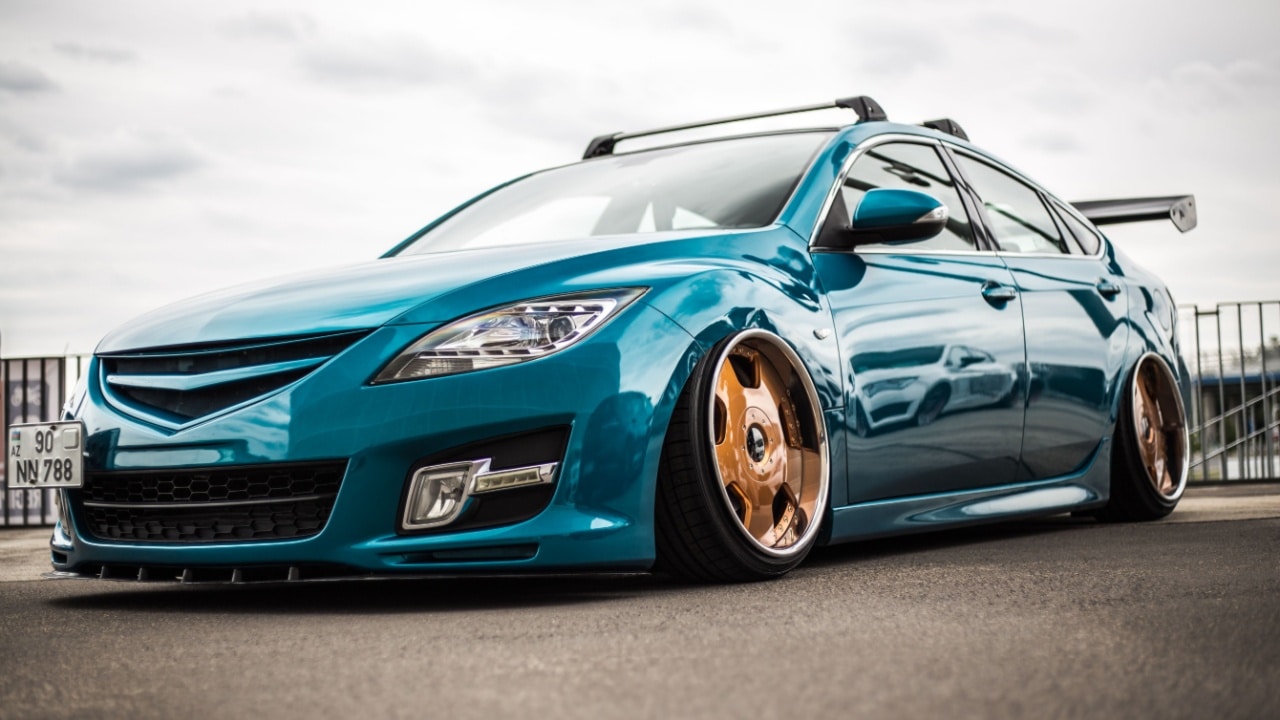15 Illegal Car Mods That Could Land Drivers in Hot Water

Many car geeks customize their vehicles to suit their individual tastes and styles. From LED headlights to cam upgrades to an optimized exhaust package, modifying a car to fit our unique preferences is a healthy form of self-expression.
But more than a handful of car customizations do too much, some of which are illegal in several states. Here are 15 illegal car mods that take it too far.
That said, car-modification laws vary from state to state–we suggest contacting the local Department of Motor Vehicles before spending money on parts and labor…or tickets, citations, and lawyers.
Lifted Suspension

While a vehicle’s height limit varies from state to state, all states have vehicle clearance laws. Some of these laws restrict the vehicle’s overall height. Others limit the bumper’s distance from the ground and make certain lift-kit materials, such as lift blocks, illegal.
States like California and Michigan allow lift kits as long as they’re designed or approved by the original vehicle manufacturer and installed by a professional mechanic.
Lowered Suspension

It’s not just raising your car off the ground that state regulations prohibit–there are also restrictions for dropping your vehicle’s height, especially when it goes too far. Some states establish a minimum clearance law that prevents bumpers or gas tanks from being close to the ground.
Other state laws restrict car tires from touching or coming within a certain proximity to the body. State regulations also limit the alteration of a vehicle’s height in either direction by a specific number of inches. Again, suspension laws are state-specific, so check into local laws before making significant changes to a car’s height.
Flashing Neon Body Lights and Colorful Underglow

A pragmatic under-light setup can help spot road hazards. On the other hand, a bold neon-under-light glow distinguishes our car from the pack by flashing neon and looking fly.
While yellow and amber neon lights are legal in most states, some states classify colored underglow or blinking neon body lights as unlawful vehicle modifications. Flashing neons that could be mistaken for police or emergency vehicles are a no-go in most places.
Removing Catalytic Converter

Whether it’s to boost your horsepower or to avoid replacing that pesky emissions control unit that left you stranded, removing your catalytic converter is illegal in 50 states.
In the Clean Air Act, the Environmental Protection Agency (EPA) clarifies that using any pipe to replace a catalytic converter is against the law. The Clean Air Act prohibits both mechanic shops and private individuals from installing “converter replacement pipes.”
Engine Swaps

Engine swapping is the impressive mechanical art of replacing a car’s entire engine to enhance performance and lifespan or increase the vehicle’s value. However, the cons of an engine swap include a change in emissions output and a shift in the vehicle’s integrity.
Some state laws prevent engine swapping from going too far. Some states have engine-change policies preventing the installation of engines unless they’re as new or newer than the automobile. Other laws limit engine swaps by weight and classification.
Blinding Headlights

Aftermarket LED lights are convenient for navigating dark roads at night, but anything over 1200 lumens is in high-beam territory. Most states have a legal limit on how close we can drive to other vehicles with our high beams on.
So if those fly headlight mods are brighter than a high beam and there’s no way to turn them off when approaching oncoming traffic, the law says it’s gone too far.
Removing Mufflers and Sound Control Units

While beefing up our pipe tone and smoke-blasting the neighborhood kids is as fun a Sunday as any, state laws limiting pollution and noise output make muffler removal illegal.
Virginia law makes it “unlawful for any person to operate a motor vehicle… on the highways in the Commonwealth with its pollution control system or device removed.” The New York Governor recently signed legislation increasing penalties for car geeks, drivers, and repair shops that illegally modify mufflers.
Loud Pipes/Aftermarket Exhaust Kits

Muffler removal isn’t the only method of making your car roar. Some exhaust system upgrades focus on quiet performance increases, but others amplify the vehicle’s sound.
Aftermarket exhaust upgrade laws are different everywhere, but the limitations typically involve emissions and sound decibel limitations. New York, for example, increased fines for illegal exhaust system equipment, requiring inspection stations to check all exhaust for illegal modifications upon inspection.
License Plate Frames

There’s little incentive to keep the raggedy plastic dealership license plate cover on your new whip, but replacing it with a distracting license cover could violate local laws. Some states require license plate lights for night-time driving, and specific aftermarket license covers block the lights from illuminating your license numbers.
While we’re on the topic of license plate obstruction going too far, avoid using neon-colored and flashing license lights to save yourself a citation in states where license lights must be white.
Light Bars/Offroad Lighting

Auxiliary lighting, like light bars and off-road flood light systems, certainly has a place in the country, but on public roads, some of these aftermarket light setups go too far.
According to Alabama state law, “Any motor vehicle may be equipped with not to exceed one auxiliary passing/driving lamp mounted on the front at a height not less than 24 inches nor more than 42 inches above the level surface upon which the vehicle stands.”
Nitrous Oxide Systems

Whether it’s the elaborate N2O kit in Fast and the Furious or the mushroom in Mario Kart, a sudden burst of horsepower is an exciting driving trick to behold. But in real life, acceleration boosters are meant for professional racers and stunt drivers, and not on public roads.
Nitrous oxide injection systems shoot the gas into a vehicle’s combustion chamber, boosting acceleration and horsepower. While Nitrous Oxide is popular among racers and performance geeks, using N2O booster on public roads is illegal. For example, Colorado State Law states that nitrous kits must be disconnected and all tanks removed for a vehicle to be considered street legal.
Diesel Engine Mods–Coal Rolling and Excess Smoke

“Coal-rolling” refers to modifying a diesel truck engine to spew thick black smoke at will. Not only does coal rolling cause unnecessary pollution, but it also obstructs the view of other drivers. Some states outlaw coal rolling explicitly. Others limit visible light for surrounding drivers.
The EPA’s Clean Air Act states that any aftermarket performance modification disabling pollution control systems is illegal. When stuck behind a diesel truck modified to “roll coal,” it’s apparent that some of these diesel engine mods go way too far.
Tinted Windshields

These days, most automobiles leave the factory with some sort of tint treatment already applied to their windows to spare drivers from harmful UV rays. Manufacturers design factory window tinting to comply with state regulations.
Many states outlaw aftermarket window tints, particularly those applied to windshields and front windows. Other laws outlaw tints that block a specific percentage of visible light transmission (VLT), aka the glass’s reflective property.
Radar Jammers

Radar detectors are precautionary devices that alert drivers when they detect a police radar gun in the area. Conversely, a radar jammer is a car mod that blocks police radar guns from reading the vehicle’s speed.
The FCC outlawed the installation and use of radar jammers back in 1996 and made selling or advertising these devices illegal.
Studded Snow Tires

Snow tires equip hard rubber or metal studs to break ice. Studded tires increase traction and keep drivers safe on sketchy winter roads.
That said, driving with studded tires is only legal during particular months of the year in most states. Other state regulations require all tire studs to be rubber–metal studs will get you a ticket.





